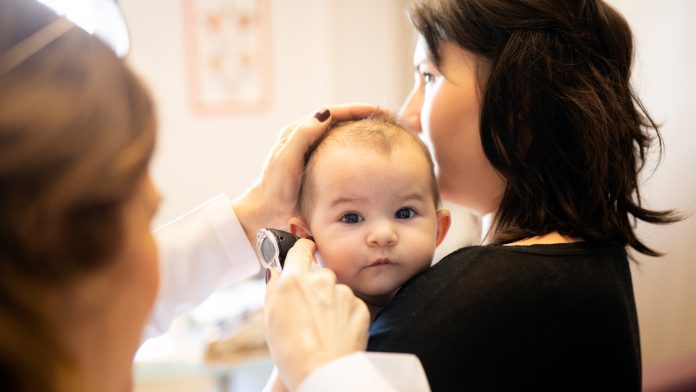
A new bedside genetic test developed by the NHS could save the hearing of many critically ill babies each year.
The innovative genetic test could transform how critically ill babies are tested for hearing loss. The test was developed in Manchester and is expected to save the NHS approximately £5m every year, by reducing other interventions, such as cochlear implants.
NHS national medical director Stephen Powis said: “The successful trial of this bedside test is fantastic news for the hundreds of babies – and their parents – who would otherwise lose their hearing when given this common antibiotic in intensive care situations.
“Through world-class innovation, the NHS is delivering cutting edge treatments to save and improve patients’ lives as well as delivering on the commitments of the NHS Long Term Plan.”
Revolutionary genetic test
The genetic test takes 25 minutes and works by identifying whether a critically ill baby that is admitted to intensive care has a gene that could result in permanent hearing loss if they are treated with a common emergency antibiotic.
The test comprises a swab test technique that will replace a test that traditionally took several days for results. This development could save the hearing of approximately 180 babies in England alone every year.
When people are admitted to intensive care, they are typically given an antibiotic called Gentamicin within 60 minutes. However, whilst this antibiotic safely treats about 100,000 babies a year, one in 500 babies carry the gene that can make it cause permanent hearing loss.
Professor Bill Newman, a Consultant in Genomic Medicine at Manchester University NHS Foundation Trust, and Professor of Translational Genomic Medicine at the University of Manchester, led the Pharmacogenetics to Avoid Loss of Hearing (PALoH) study.
Newman explained:: “I am absolutely thrilled with the success of the study, and that this testing is now going to be used in three of our Trust’s Neonatal Intensive Care Units – it is actually going to make a real difference so babies are not going to lose their hearing for a preventable reason.
“The trial demonstrated that you can deploy rapid genetic testing in a clinical setting and that the tests can be carried out within the ‘golden hour’ when severely unwell babies should be treated with antibiotics.”
Training nurses on the new technique
Following the study completion, the NHS Genomic Medicine Service Alliance and the NHS will explore how this genetic test can be launched as part of a clinical service through the NHS Genomic Medicine Service.
Approximately 300 nurses are being trained to utilise the machine across MFT at Saint Mary’s Hospital, Wythenshawe Hospital, and North Manchester General Hospital, and the test is expected to be routinely employed in all the hospitals’ neonatal units within weeks, which are part of Saint Mary’s Managed Clinical Service within the Trust.
The idea for the genetic test arose approximately five years ago, and trials started in 2020 with further adaptations and fine-tuning so that the current machine, known as the Genedrive System, is now fully CE certified to be utilised in a clinical setting.
This project received £900,000 in funding from the National Institute for Health Research (NIHR), and support from the charity Royal National Institute for Deaf People, and their Genedrive System, which costs £80 per baby, and was developed by Genedrive, a start-up based at the University of Manchester. Additionally, this testing was also developed in close collaboration with Professor Newman’s team at Manchester Biomedical Research Centre.






















